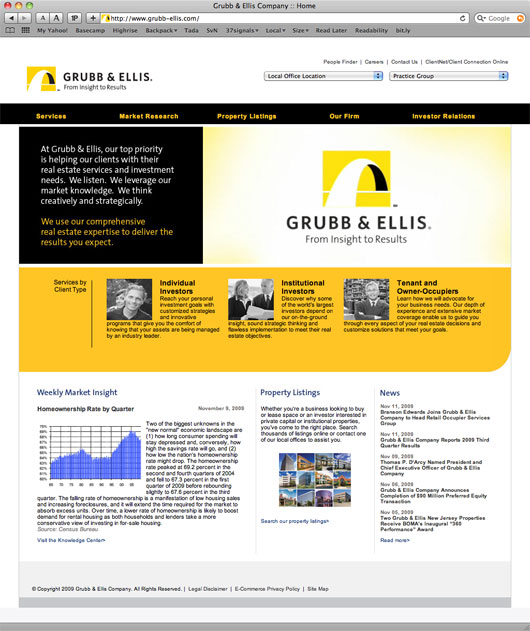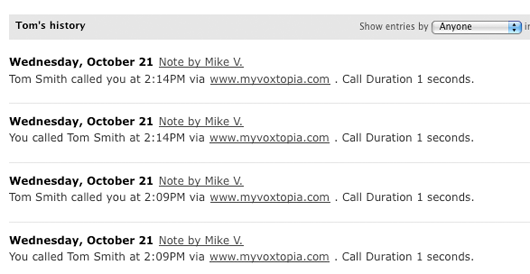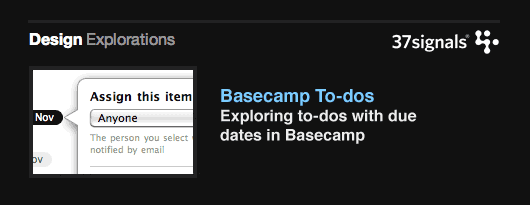If you had to give it up, which subscription would you miss the most?
Design Explorations: Basecamp To-dos with Due Dates
We’ve just posted another article in our series of Design Explorations. This installment shows our process for adding a new feature to Basecamp: Add due dates to to-dos.
We’re excited about this new feature and anxious to share this latest peek at our design process. Read the full Basecamp to-dos design exploration.
[Podcast] Episode #2: Tech company valuations
Download MP3 | Time: 24:10
Like this episode? Please share it with your friends:
37signals worth $100 billion?
Start time: 0:37
The story behind the mock press release claiming 37signals is worth $100 billion. The press should be more critical in covering valuation stories. Eyeballs aren’t the only thing that matter.
The valuation dance
Start time: 8:45
Was the press release a shot at Twitter, Facebook, and YouTube? Why was the sale of Mint to Intuit disappointing? Where will the next great generation of companies come from if they keep selling early? Also, VC money is a time bomb.
Mojito Island is a mirage
Start time: 15:23
The idea of selling a company for a big pot of money and living happily ever after doesn’t actually happen. People who make great companies are inherently driven and don’t want to live a life of leisure. If you’re succeeding on something now, stick with it. Otherwise, you may wind up looking backwards “for the love of the game.”
Related links and previous episodes available at 37signals.com/podcast. Subscribe to the podcast via iTunes or RSS.
Nothing gets you more focused on solving a problem than actually having that problem.
Getting Real (the musical way) with Rodrigo and Gabriela
Signal vs. Noise reader and JobChoy founder Mark Meeus writes:
I’m not sure if you know Rodrigo and Gabriela and their story, if you do you can stop reading right now ;-)
I want to tell you briefly their story because it is a good example of Getting Real applied to something else than webapps.
Rodrigo and Gabriela started out as heavy-metal guitarists in a band in Mexico City. Their goal in life was to do nothing but music, but it didn’t went well. They both failed to enter the conservatory in Mexico City and their band wasn’t going where they wanted it to go.
So they decided to sell all of their stuff and just keep their acoustic guitars. They moved to Dublin where they started to play in bars and busking on the streets and in metro stations.
In the beginning they played Metallica covers, but soon enough they got bored and started to write their own songs.
They needed the money so they had to ‘optimize’ their music. They would write a song, tested it live to see how much money they got, rewrote it a bit, see how much they got, rewrote it a bit, …. (A/B testing on music.)
After a while they managed to save some money and started to move to other cities, along the way they gained a bigger audience and became ‘known’ in those cities.
In 2006 they released an album (Rodrigo y Gabriela) which took the Irish hit charts by storm, the first instrumental band ever to do that.
Now what’s so ‘real’ about this story?
They didn’t listen to all those people telling them ‘just 2 guitars’ will never work
- A team of 2!
- No outside money (with todays technology that’s not so uncommon, but they did it before 2000).
- Just 2 guitars, underdoing the competition
- Passion
- Constraints: no money, no other instruments
- They hired the right audience and focused solely on them
- Their music is opinionated
- Race to live music/testing in the wild, composing a song and immediately playing it at the street.
Apart from all this, their music is really great, but that’s a matter of taste isn’t it?
Which is more useful? Google's links or the actual home page?
It’s interesting how many of Google’s expanded listings have become even more useful than the home page behind the link.
For example, take these two examples. One is the Google listing for Grub & Ellis. The second is the Grub & Ellis home page you get when you click the search result link.
The Google listing

The actual home page

I find the expanded Google listing more useful. It cuts right to what I want to know 95% of the time.
And it’s not just this example site — I’ve found the expanded Google listings more useful than just about any home page I’ve visited lately. What does that say about the state of web design?
37signals on Twitter
Just launched: Twitter.com/37svn posts a message each time there’s a new entry here at Signal vs. Noise.
That’s in addition to Twitter.com/37signals which features news, updates to our products, posts from the Product Blog, etc.
You can also follow David, Jason, Matt, or other 37signals team members.
How Chipotle, Pinkberry, and others win big by doing just a few things well
The dirty little secret about simple: It’s actually hard to do. That’s why most people make complex stuff. Simple requires deep thought, discipline, and patience – things that many companies lack. That leaves room for you. Do something simpler than your competitors and you’ll win over a lot of people.
There are only three major items on Chipotle’s menu: burritos, tacos, and salads. In Chipotle’s Secret Salsa, Founder and CEO Steve Ells sums up its business model in a single sentence: “Focus on just a few things, and do them better than anybody else.”
One thing you won’t find at Chipotle is dessert. Restaurant analysts say a cookie or other dessert at the end of the food line could instantly boost sales by 10 percent or more there. Ells doesn’t care. “We’ve had 10 years of double-digit comps in a row, and we’ve done that without cookies,” he says. “So why start now? I see only the downside to adding cookies.”
The yogurt chain Pinkberry started off by selling only two flavors of yogurt: original and green tea. That meant fewer worries about inventory, machinery, recipes, and other complications that would have resulted from selling a variety of products. Instead the company focused on flavor. It’s now a chain with dozens of stores and devout fans who refer to the yogurt as “Crackberry.” (Ever think about how your product would sound with “crack” as a prefix?)
This isn’t just for restaurants either. Nintendo has won big by doing less than competitors. The Flip has won a big percentage of the camcorder market by doing less. Fixed-gear bikes have been growing in popularity due to their simple, low-maintenance design.
You can try to win a features arms race by offering everything under the sun. Or you can just focus on a couple of things and do ‘em really well and get people who really love those things to love your product. For little guys, that’s a smarter route.
When you choose that path, you get clarity. Everything is simpler. It’s simpler to explain your product. It’s simpler for people to understand. It’s simpler to change it. It’s simpler to maintain it. It’s simpler to start using it. The ingredients are simpler. The packaging is simpler. Supporting it is simpler. The manual is simpler. Figuring out your message is simpler. And most importantly, succeeding is simpler.
If you set your goals ridiculously high and it’s a failure, you will fail above everyone else’s success.
James Cameron, director of Terminator and Titanic, from The New Yorker
Product blog update: New extras for Highrise, Basecamp on Nightline, etc.
Some recent posts at the 37signals Product Blog:
Highrise
Why Highrise is the best way for real estate agents to manage leads
“Before Highrise, I’d used a variety of real estate specific CRMS, plugins for outlook, and everything else I could find. After I spent half a day installing, syncing, etc, the novelty would wear off and I wouldn’t use them consistently. Highrise is simple and speedy enough that it’s painless to use consistently.”
Bungalow lets you manage your Highrise task list on your iPhone
“Bungalow brings your Highrise task list to your iPhone so you can manage them on the go. Even if you are not connected to the internet you can tick tasks off, edit them and create new tasks with seamless background syncing when you’re back online.”


New Voxtopia extra lets you track your calls through your Highrise account
“With Voxtopia’s integration, you can now track all incoming & outgoing calls through your Highrise account. Voxtopia will automatically add a note to your contacts when you make a call to or receive a call by one of your contacts through Voxtopia.”

Prefinery manages software betas and integrates with Highrise
Prefinery manages betas (for webapps and desktop software) — and it integrates with Highrise. It allows customers to create a splash page, supports a sign-up form with fields and survey questions, and handles incrementally inviting users. Customers can sync their list of testers (early adopters, best customers) with Highrise via the API to track leads, conversations, etc for further down the road. Prefinery also integrates with MailChimp.




